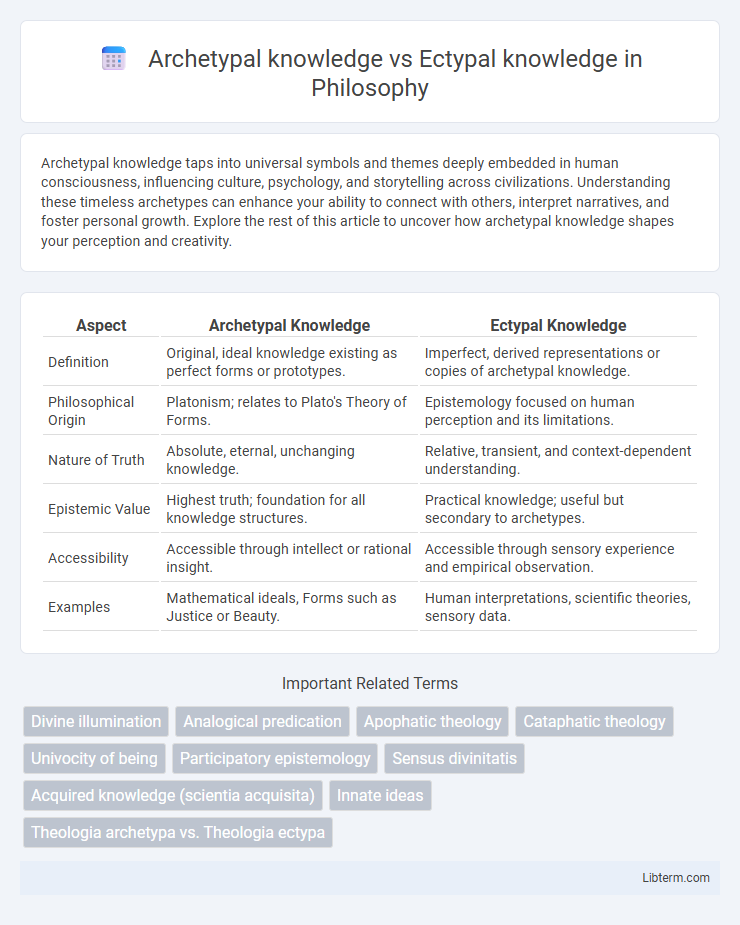Archetypal knowledge taps into universal symbols and themes deeply embedded in human consciousness, influencing culture, psychology, and storytelling across civilizations. Understanding these timeless archetypes can enhance your ability to connect with others, interpret narratives, and foster personal growth. Explore the rest of this article to uncover how archetypal knowledge shapes your perception and creativity.
Table of Comparison
| Aspect | Archetypal Knowledge | Ectypal Knowledge |
|---|---|---|
| Definition | Original, ideal knowledge existing as perfect forms or prototypes. | Imperfect, derived representations or copies of archetypal knowledge. |
| Philosophical Origin | Platonism; relates to Plato's Theory of Forms. | Epistemology focused on human perception and its limitations. |
| Nature of Truth | Absolute, eternal, unchanging knowledge. | Relative, transient, and context-dependent understanding. |
| Epistemic Value | Highest truth; foundation for all knowledge structures. | Practical knowledge; useful but secondary to archetypes. |
| Accessibility | Accessible through intellect or rational insight. | Accessible through sensory experience and empirical observation. |
| Examples | Mathematical ideals, Forms such as Justice or Beauty. | Human interpretations, scientific theories, sensory data. |
Introduction to Archetypal and Ectypal Knowledge
Archetypal knowledge refers to pure, original, and perfect forms of knowledge existing in an ideal or divine realm, representing the ultimate truth or essence of concepts. Ectypal knowledge is the imperfect, derived, and concrete understanding obtained through sensory experience and human cognition, reflecting the archetypal forms in a limited and subjective way. This distinction highlights the difference between ideal knowledge and its practical manifestation in the material world.
Defining Archetypal Knowledge
Archetypal knowledge represents the original, perfect form of knowledge existing in a transcendent realm, serving as the ultimate blueprint for all derived understanding. It embodies ideal, immutable truths that manifest as ectypal knowledge in various imperfect, physical or cognitive copies. Defining archetypal knowledge involves recognizing its role as the foundational, source knowledge underlying all manifestations of learned information.
Defining Ectypal Knowledge
Ectypal knowledge represents imperfect, derivative understanding derived from archetypal knowledge, which is the original, ideal source of truth and forms the highest level of cognition. This type of knowledge is contextual, limited by human perception and experience, and is often shaped by cultural or individual interpretations. Defining ectypal knowledge involves recognizing it as a secondary, distorted reflection of the perfect, unchanging archetypal forms found in Platonic philosophy.
Philosophical Origins of the Concepts
Archetypal knowledge originates from Platonic philosophy, where it is conceived as ideal, eternal forms existing in a metaphysical realm, serving as the perfect templates for all phenomena in the sensible world. Ectypal knowledge, in contrast, refers to the imperfect and derivative representations of these archetypes as experienced through empirical observation and human cognition. The distinction emphasizes the ontological hierarchy between pure, immutable truths and their mutable, perceptual imitations, reflecting the foundational discourse on knowledge and reality in classical philosophy.
Archetypal vs Ectypal: Key Differences
Archetypal knowledge represents original, perfect, and divine concepts existing in an ideal realm, while ectypal knowledge consists of imperfect, derived representations shaped by sensory experience in the physical world. Archetypal knowledge is universal and timeless, reflecting the true essence of reality, whereas ectypal knowledge is contingent, subjective, and often limited by human perception. The key difference lies in archetypal knowledge's ontological priority and absolute nature compared to ectypal knowledge's dependent and empirical character.
Theological Significance in Historical Context
Archetypal knowledge in theology represents the divine, perfect, and original knowledge held by God, reflecting ultimate truth and omniscience, while ectypal knowledge denotes the imperfect, finite understanding possessed by humans as derived images of divine cognition. Historically, this distinction shaped medieval Scholasticism, influencing how theologians reconciled human reason with divine revelation, emphasizing humans as limited reflectors of God's transcendent wisdom. The theological significance lies in affirming the ontological gap between Creator and creation, underscoring humility in human knowledge and the necessity of grace for deeper spiritual insight.
Implications for Human Understanding
Archetypal knowledge refers to the original, ideal form of knowledge existing in its purest conceptual state, while ectypal knowledge represents the derived or imperfect copies perceived by human senses. The distinction implies that human understanding is fundamentally limited to interpretations and representations rather than direct access to ultimate truths. This limitation influences epistemology by necessitating critical examination of how knowledge is acquired, framed, and validated within cognitive and perceptual constraints.
Archetypal and Ectypal Knowledge in Epistemology
Archetypal knowledge in epistemology refers to direct, intuitive understanding of universal truths or forms, often considered innate or a priori. Ectypal knowledge is the derivative, sensory-based understanding of particular instances or representations of these universal forms. The distinction highlights epistemology's exploration of knowledge grounding: archetypal as perfect, original cognition, and ectypal as imperfect, mediated cognition informed by empirical experience.
Contemporary Debates and Perspectives
Contemporary debates on archetypal versus ectypal knowledge center on the ontological and epistemological distinctions between ideal forms and their representations or copies. Scholars emphasize archetypal knowledge as access to universal, unchanging truths, while ectypal knowledge pertains to empirical, context-dependent manifestations subject to variation. Perspectives highlight tensions in knowledge transmission, with archetypal frameworks underpinning theoretical models and ectypal knowledge informing practical applications and sensory experience.
Conclusion: Synthesizing Insights and Future Directions
Archetypal knowledge represents universal, ideal forms foundational to understanding reality, whereas ectypal knowledge refers to imperfect, mediated representations derived from those ideals. Synthesizing insights from both domains emphasizes the importance of balancing abstract, invariant concepts with concrete, contextual applications to foster comprehensive cognition. Future research should explore integrative frameworks that leverage archetypal structures to enhance the accuracy and adaptability of ectypal models in fields such as epistemology, artificial intelligence, and cognitive science.
Archetypal knowledge Infographic

 libterm.com
libterm.com